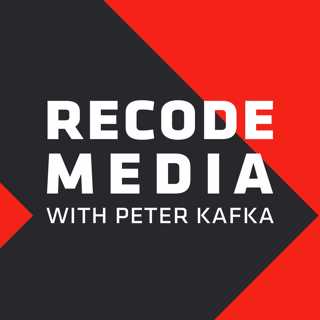
We're not startup bros anymore (Ilan Zechory and Tom Lehman, co-founders, Genius)
Genius co-founders Ilan Zechory and Tom Lehman talk with Recode's Peter Kafka about how they and their business are maturing. Genius, which started as music-annotating service RapGenius, is now striking deals with major media companies to let users and brands insert factoids into content across the web. Zechory and Lehman discuss how they're trying to make Genius annotations omnipresent, and address allegations that their platform facilitates abuse. Learn more about your ad choices. Visit podcastchoices.com/adchoices
4 Aug 201634min

So, you’ve been shamed by Twitter (Virginia Heffernan, author, "Magic and Loss")
Virginia Heffernan, author of the new book "Magic and Loss: The Internet as Art," talks with Recode's Peter Kafka about the physical things we risk losing as we digitize more and more of our lives. She praises Snapchat's "brilliance" for preserving impermanent media and talks about what happened when critics of an article about creationism threw her into the "Twitter coliseum." To cope with the social media onslaught, she came to imagine her Twitter handle, @page88, as a tougher, wittier persona who could take the abuse on her behalf. Learn more about your ad choices. Visit podcastchoices.com/adchoices
28 Juli 201639min

Gary Vaynerchuk can't wait for the startup armageddon
Investor and VaynerMedia co-founder Gary Vaynerchuk talks with Recode's Peter Kafka about how he parlayed early success on Google AdWords and YouTube into an agency that helps other brands succeed online. A social media celebrity in his own right, Vaynerchuk calls himself an "entrepreneur through and through" but says tech and media are riddled with phony entrepreneurs who are heading for an "armageddon." He laments today's rising startup valuations as a worrying sequel to the early-2000s dotcom crash. Learn more about your ad choices. Visit podcastchoices.com/adchoices
21 Juli 201622min

Donald Trump is bad for democracy (Jacob Weisberg, chairman, Slate Group)
Slate Group Chairman Jacob Weisberg talks with Recode's Peter Kafka about his podcast Trumpcast, which obsesses over presumptive Republican nominee Donald Trump and his following. Weisberg says Trump will leave a big mark on American politics even if he loses to Hillary Clinton in November. He also discusses how Slate has changed since it launched as a digital magazine in 1996, what social networks it is and isn't using and why media companies should be wary of Facebook's growing power. Learn more about your ad choices. Visit podcastchoices.com/adchoices
14 Juli 201636min

Documentarian Alex Gibney says the Stuxnet virus was a "new kind of weapon"
"Zero Days" director Alex Gibney talks with Recode's Peter Kafka about his new film's focus on the Stuxnet virus, which sabotaged the Iranian nuclear program. He compares Stuxnet's attack to the first nuclear bomb attacks on Hiroshima and Nagasaki and calls for countries to open a dialogue about cyberweapons. Gibney also discusses his other documentaries, including "Going Clear," "Steve Jobs: The Man in the Machine" and "Enron: The Smartest Guys in the Room." Learn more about your ad choices. Visit podcastchoices.com/adchoices
7 Juli 201632min

Daring Fireball's John Gruber: "I'm a writer first and a businessman second"
Daring Fireball founder and sole employee John Gruber talks with Recode's Peter Kafka about running a one-man media company. Gruber has been writing about Apple since 2002 but he estimates that his podcast — which started in 2013 — now represents half of Daring Fireball's revenue. He explains how he got into writing in the early days of web blogging and why he has opted to monetize his site by having only one sponsor per week. Gruber also chats about Steve Jobs's legacy, why he doesn't love the Apple Watch and the alleged influence of Apple's corporate team on his writing. Learn more about your ad choices. Visit podcastchoices.com/adchoices
30 Juni 201639min

Steve Jobs "literally caught me with my pants down" (Brian Lam, founder, The Wirecutter)
The Wirecutter founder Brian Lam talks with Recode's Peter Kafka about creating a modern update to Consumer Reports that makes best-in-class buying recommendations across a range of products. He also discusses his previous life as editor in chief of Gawker's technology blog Gizmodo, which famously obtained and wrote about the iPhone 4 before it was released. That led to a testy phone call from Apple CEO Steve Jobs, who "really didn’t like losing that mini chess game," Lam says. Learn more about your ad choices. Visit podcastchoices.com/adchoices
23 Juni 201636min

Malcolm Gladwell wants to make you cry
Malcolm Gladwell, New Yorker columnist and author of "The Tipping Point," talks with Recode's Peter Kafka about his new podcast, "Revisionist History." Gladwell thinks his new foray into audio will have a more emotional effect on listeners than his columns and books, because "you feel with your ears and you think with your eyes." He also discusses how he wandered into a job at the Washington Post in the 1980s and the proliferation of mass shootings in America, from Columbine to this week's tragic attack on the Pulse nightclub in Orlando. Learn more about your ad choices. Visit podcastchoices.com/adchoices
16 Juni 201635min






















